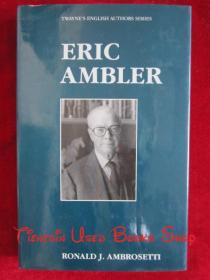
Eric Ambler(Twayne's English Authors)(货号TJ)
埃里克·安布勒(Eric Ambler,1909年-1998年),英国小说家,主要创作间谍和犯罪小说。
¥ 269 ¥ 72 九五品
仅1件
作者Ronald J. Ambrosetti
出版社Twayne Publishers, Inc.
ISBN9780805783698
出版时间1994
版次1
印刷时间1994
印次1
装帧精装
开本22.5*15
纸张胶版纸
页数192页
定价72元
货号TJ2506-I274
上书时间2024-02-14
- 在售商品 暂无
- 平均发货时间 8小时
- 好评率 暂无
- 最新上架
商品详情
- 品相描述:九五品
- 商品描述
-
本书原定价72.00美元,净重400克,馆藏自然旧。【图书分类:文学 > 各国文学 > 英国文学 > 各体文学评论和研究 > 小说】Series Editors: Kinley E. Roby, Northeastern University; Herbert Sussman, Northeastern University; Joseph Bartolomeo, University of Massachusetts; George Economou, University of Oklahoma; Arthur F. Kinney, University of Massachusetts
Twaynes United States Authors, English Authors, and World Authors Series present concise critical introductions to great writers and their works.
Devoted to critical interpretation and discussion of an authors work, each study takes account of major literary trends and important scholarly contributions and provides new critical insights with an original point of view. An Authors Series volumeaddresses readers ranging from advanced high school students to university professors. The book suggests to the informed reader new ways of considering a writers work. A reader new to the work under examination will, after reading theAuthors Series, be compelled to turn to the originals, bringing to the reading a basic knowledge and fresh critical perspectives. Each volume features:
A critical, interpretive study and explication of the authors works
A brief biography of the author
An accessible chronology outlining the life, work, and relevant historical background of the author
Aids for further study -- complete notes and references, a selected annotated bibliography, and an index
A readable style presented in a manageable length
From the Back Cover:
Born in London in 1909, Ambler had by the age of thirty produced a group of novels that would forever change the fundamental nature of the suspense thriller. In such works as Dark Frontier (1936), Background to Danger (1937), Epitaph for a Spy (1938), and A Coffin for Dimitrios (1939), Ambler eschewed the cloak-and-dagger formula of what he called "the old secret service thrillers" for a new kind of spy story that concerned itself with the psychological, social, philosophical, and political issues of the modern age. He sought to "intellectualize' the older, anemic spy story", Ambrosetti writes, and drew from his intensive reading of Friedrich Nietzsche, C. G. Jung. Oswald Spengler, and other modernist thinkers and writers to do so. Current criticism generally takes the view that Ambler's best work is in these early, path-breaking novels. Ambrosetti contests this position, finding evidence of Ambler's maturation as a writer in terms of character development, social and political verisimilitude, and cognizance of moral subtlety. Gone from the novels of the 1950s onward are the one-dimensional ideologues of the collectivist 1930s; in their place are ambivalent, alienated characters, morally confused and psychologically homeless. In such novels as State of Siege (1956), Passage of Arms (1959), and The Light of Day (1962), Ambler considered the West's post-World War II view of the East - politically and psychologically - as the mysterious, untrustworthy "other". In the five books he devoted to this topic, Ambler took up the theme of the Western traveler on a journey of self-discovery and exploration; as one book followed the next into publication, Ambler's protagonists evolved from a stanceof fearful and condescending fascination to one of at least partial understanding and involvement. Ambler's interest in the evolving personality, the ability to adapt, is apparent throughout his work. His protagonists are often fairly average, sometimes troubled men whose accidental involvement in a sinister maze of international spying and intrigue transforms them. In such later novels as A Kind of Anger (1964) and The Intercom Conspiracy (1969), Ambler perfected what Ambrosetti calls the concept of "trickster as hero". The trickster embodies Ambler's belief that in the twentieth century survival - psychic and otherwise - depends on the capacity to change in response to a treacherously shifting environment without losing sight of the forces at work - both good and malevolent - within one's own consciousness. Not unlike one of his spy-protagonists, Ambrosetti argues, Ambler as author has deftly managed the trick of literary transformation throughout his long career.
About the Author:
Ronald J. Ambrosetti is professor of English and associate dean of arts and sciences at the State University of New York College at Fredonia.
-

【封面】
-

【封底】
-

【内页】
-

【内页】
-

【内页】
-

【目录】
-

【内页】
-

【内页】
-

【内页】
— 没有更多了 —


















以下为对购买帮助不大的评价